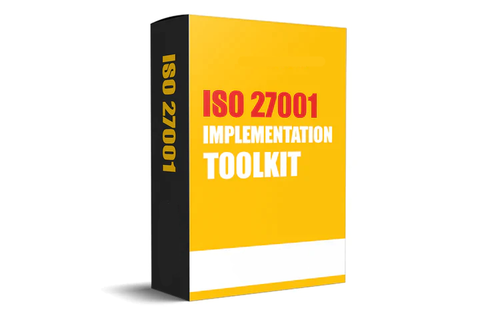Why ISO 27001 Matters for Your Business?
Information security is a critical issue in today's interconnected and fast-paced world. In a world where digital networks are seamlessly connected, it's impossible to overstate the importance of strong information security. Cyberattacks, data breaches, and information theft are a constant threat to organizations of all sizes across various industries.

ISO 27001 is a guide in this environment. It offers a comprehensive framework to empower organizations with the ability to create, implement, monitor, and continuously improve their information security management systems. ISO 27001, with its focus on risk, compliance, and best practices, plays a crucial role in protecting sensitive information, improving organizational resilience, and maintaining trust in this digital age.
Information Security Evolution: A Must In The Digital Era
The exponential growth of digital data, both in volume and value, is a fact that cannot be denied. Cloud computing, interconnected devices, and complex technological ecosystems are used by modern organizations to improve customer experience, optimize operations, and drive innovation. This remarkable digital transformation has revealed a Pandora's Box of unprecedented cybersecurity risks. Cyber threats such as malware, ransomware, and phishing have risen rapidly, creating a major challenge for organizations.
ISO 27001 takes on these challenges with a structured approach for identifying, evaluating, and managing risks to information security. Its adaptability, scalability, and flexibility make it suitable for entities of all sizes and complexity. Integrating ISO 27001 principles seamlessly into their fabric allows organizations to proactively counter risks, protect sensitive information, and uphold the tenets of confidentiality, integrity, and availability in this dynamic digital age.
ISO 27001 Core Principles: Holistic And Proactive Security
ISO 27001 is based on a number of core principles that highlight its effectiveness and importance. These principles help organizations develop a holistic, proactive approach to security.
- Risk Management: ISO 27001 puts risk management at the forefront of security practices. It encourages organizations to identify vulnerabilities, assess threats, and implement controls that mitigate risk. This proactive, risk-based approach allows organizations to anticipate potential security breaches and respond before they happen.
- Comprehensive Framework: ISO 27001 offers a comprehensive framework that encompasses technology, people, and processes. This holistic approach recognizes the fact that information security is a multifaceted process involving policies, procedures, and employee awareness.
- Legal Compliance: Organizations around the world are concerned about adhering to a complex web of privacy and data protection regulations. ISO 27001 helps organizations achieve compliance with legal and regulation requirements by creating a robust Information Security Management System (ISMS). This system helps organizations to ensure that they are able to manage personal data in a responsible manner and according to applicable laws.
- Business Resilience And Continuity: ISO 27001 stresses the importance of planning for business continuity. Organizations can achieve operational resilience by identifying key business processes, creating contingency plans, and testing them.
- Employee Training And Engagement: The people remain the most important asset and vulnerability of any security strategy. ISO 27001 emphasizes the importance of employee engagement and security awareness training. Employees who are trained on security risks and best practices become the first line of defense in the fight against cyber threats.

Benefits That Are Tangible And Have Real-World Impact
ISO 27001 offers tangible benefits for organizations that go beyond the theoretical frameworks.
- Improved Customer Trust And Reputation: ISO 27001 Certification serves as a powerful testimony to an organization’s commitment to safeguarding customers' data. This certification helps to build customer trust in an age of privacy and data breaches.
- Competitive Advantage: Organizations that achieve ISO 27001 certification distinguish themselves on the market. The certification shows a commitment to robust security practices and gives them an edge in the competition for contracts, partnerships, and customers.
- Cost-Savings And Efficiency: ISO 27001 encourages organizations to streamline processes and better allocate resources. Cost savings and improved operational efficiency can be achieved by eliminating redundant processes and optimizing security.
- Effective Relationships With Third Parties: In a world of interconnected businesses, third-party vendors and partners are important. ISO certification allows for smoother collaborations because it ensures that all parties adhere to the same standard of information security.
- Regulatory Compliance: Navigating the dynamic and ever-changing landscape of data protection laws can be difficult. ISO 27001 places a strong emphasis on compliance, which helps organizations stay up to date with the latest legal requirements and reduces the risk of penalties for non-compliance.
Embracing ISO 27001: A Strategic Imperative
ISO 27001 is a crucial shield in an interconnected, information-driven world. ISO 27001's comprehensive approach to data protection, its emphasis on risk management, and its seamless integration with existing legal mandates place it at the forefront of modern organizational blueprints. The implementation of ISO 27001 is a powerful tool that helps organizations not only survive cyber threats but also thrive in an age defined by the importance and ubiquity of data.
Conclusion
ISO 27001 offers organizations a framework that is robust enough to tackle the many challenges associated with information security. ISO 27001 promotes risk management, compliance, and a holistic view of information security. This allows organizations to protect sensitive data, increase customer trust, and gain a competitive edge. ISO 27001 is no longer an option for organizations that want to flourish and succeed in a digital world.
The certification allows organizations to take a proactive approach against cyber threats and position themselves as beacons of confidence in a world interconnected. ISO 27001 allows organizations to confidently navigate through the terrain of data security while being prepared for the challenges ahead.




